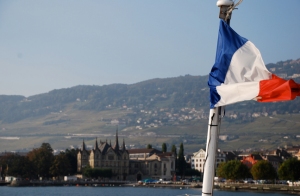❝If you talk to a man in a language he understands, that goes to his head. If you talk to him in his own language, that goes to his heart.❞
‒Nelson Mandela
Learning a new language is tough. Many cultures of the world carry long oral tradition and pass along much unwritten history, stories, and the unique speech dialects to the next generation. I suppose this is what makes each beautiful, the articulate differences color specific languages sharply and make it more difficult to learn without truly understanding the origins, customs, and attitudes of each one. Even regionally, the dialect of the same language will greatly vary and sound completely new. I had this experience in 2001 when travelling between Arequipa and Lima, Peru. The dialect of Spanish was sharp, fast, almost witty in Lima, while in Arequipa it was more slow, relaxed and much more easy for my ears to comprehend.
Taking it upon myself to learn the French language is a gritty challenge but also a personal and spiritual goal. My great grandmother Louise McGee earned her Bachelor of Arts in French degree at UC Berkeley. I feel it would be only the beginning of a special tradition to follow in her footsteps, learn French, and live in France for four years to solidify the language. An idea I have been musing on includes trying to integrate readings of French and European period history with learning the language. At the moment, I am using Rosetta Stone French levels 1-5 to help me make my goal a reality. Rosetta Stone is unusual yet very effective in it’s teaching style, as it uses only photos and verbal tones to teach the language. As a visual learner, it is great for someone like me! Even though I am admittedly still on level one, I have no deadline as of now as I am also finishing my Bachelor of Science in Business Administration at the University of Nevada, Reno. Time is all I need.
Oddly enough, my European girlfriend Julie who is bilingual with multiple languages (Dutch, French, Swedish, German, and Italian) said to NOT learn French from the Canadians…she said Jessica, No! You will speak terrible French! That is just not French! It made my laugh heartily and reminisce over how much I miss Europeans. However, for sake of learning the words and price of plane tickets from the US, I may just take my chances and fly to Ottawa when I reach a moderate level of French speaking ability.
According to Voxy News article,”Why it Pays to be Bilingual”, the benefits of learning languages include:
- Increasing cognitive development and abilities
- Improve metalinguistic skills
- Advance verbal and special abilities
- Augment memory skills
- Become a better multitasker
- May protect against Alzheimer’s disease when switching between two language systems
- Might make more money with such a marketable skill as an asset
- Become more bicultural and understanding of separate cultures
“The time lost, the eternal return, time found, it can be thought of together. Moreover every writer a little interesting only interested in time and how to get out … but the time defends, time has its enthusiasts, the time has its clergy. Time will continue to be the time it takes. “
Philippe Sollers, on Proust, in praise of infinity.
When learning a language, take your time to understand the heritage(s) underlying the words you are speaking. Realizing why irregular verbs are so different and absorbing the impact it has on you as an individual all make the experience more fulfilling and dramatic in the best way. Just imagine the future experiences, such as when you can dream in German or Spanish or whichever language you wish to pursue. Enjoy!
Are you currently learning a language? Which one? Do you aspire to learn several languages one day? Please comment below.
A photo of me standing across from the Arc de Triomphe de l’Étoile


